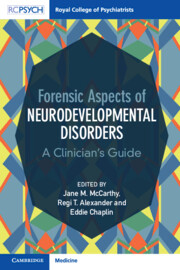Book contents
- Forensic Aspects of Neurodevelopmental Disorders
- Forensic Aspects of Neurodevelopmental Disorders
- Copyright page
- About the Cover Page
- Contents
- Contributors
- Foreword by the Rt Hon Lord Bradley
- Terminology Used in the Book
- Section 1 An Overview: Definitions, Epidemiology and Policy Issues
- Chapter 1 Introduction
- Chapter 2 Aetiology of Neurodevelopmental Disorders
- Chapter 3 Overview of Offenders with Intellectual Disability
- Chapter 4 Overview of Offenders with Attention Deficit Hyperactivity Disorder
- Chapter 5 Overview of Offenders with Autism Spectrum Disorder
- Chapter 6 Associations between Autism Spectrum Disorder and Types of Offences
- Chapter 7 Overview of Young People with Neurodevelopmental Impairments in Contact with the Youth Justice System
- Chapter 8 Overview of Offenders with Fetal Alcohol Spectrum Disorders
- Chapter 9 The Role of Subthreshold Neurodevelopmental Disorder in Offending Behaviour
- Chapter 10 Comorbid Mental Disorders and Neurodevelopmental Conditions
- Section 2 Assessment and Therapeutic Approach
- Section 3 Criminal Justice Pathways and Legal Issues
- Index
- References
Chapter 2 - Aetiology of Neurodevelopmental Disorders
from Section 1 - An Overview: Definitions, Epidemiology and Policy Issues
Published online by Cambridge University Press: 18 May 2023
- Forensic Aspects of Neurodevelopmental Disorders
- Forensic Aspects of Neurodevelopmental Disorders
- Copyright page
- About the Cover Page
- Contents
- Contributors
- Foreword by the Rt Hon Lord Bradley
- Terminology Used in the Book
- Section 1 An Overview: Definitions, Epidemiology and Policy Issues
- Chapter 1 Introduction
- Chapter 2 Aetiology of Neurodevelopmental Disorders
- Chapter 3 Overview of Offenders with Intellectual Disability
- Chapter 4 Overview of Offenders with Attention Deficit Hyperactivity Disorder
- Chapter 5 Overview of Offenders with Autism Spectrum Disorder
- Chapter 6 Associations between Autism Spectrum Disorder and Types of Offences
- Chapter 7 Overview of Young People with Neurodevelopmental Impairments in Contact with the Youth Justice System
- Chapter 8 Overview of Offenders with Fetal Alcohol Spectrum Disorders
- Chapter 9 The Role of Subthreshold Neurodevelopmental Disorder in Offending Behaviour
- Chapter 10 Comorbid Mental Disorders and Neurodevelopmental Conditions
- Section 2 Assessment and Therapeutic Approach
- Section 3 Criminal Justice Pathways and Legal Issues
- Index
- References
Summary
Neurodevelopmental disorders is an umbrella term that incorporates a range of conditions characterised by some form of disruption to ‘typical’ brain development. These disorders share aetiological pathways that have genetic, social and environmental risk factors. Neurodevelopmental disorders often have core features in common and they frequently co-occur. Long-term impairment is characteristic, although key features may vary over the life span. This chapter covers key aspects of the aetiology of neurodevelopmental disorders, in particular focusing on those found in forensic settings (such as autism spectrum disorder, intellectual disability, attention deficit and hyperactivity disorder and fetal alcohol spectrum disorder). The impact of genetic, social and environmental risk factors is considered. The chapter considers the aetiology of neurodevelopmental disorders as relevant to forensic settings.
Keywords
- Type
- Chapter
- Information
- Forensic Aspects of Neurodevelopmental DisordersA Clinician's Guide, pp. 13 - 23Publisher: Cambridge University PressPrint publication year: 2023
References
- 1
- Cited by

